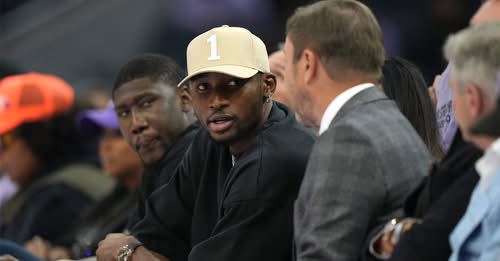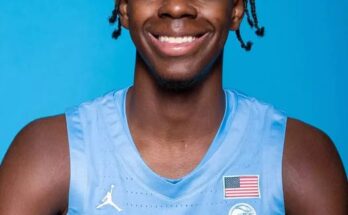Jonathan Kuminga’s ongoing contract standoff with the Golden State Warriors is far more than just a standard negotiation—it’s a defining moment in a young player’s career and a franchise’s direction. At the center of the dispute is a word that has started to resonate across the league: “pawn.” That’s what Kuminga reportedly refuses to become. He doesn’t want to be a chess piece moved for convenience or flexibility. He wants control, recognition, and a commitment that matches the value he believes he brings.
According to multiple reports, Kuminga declined a two-year, \$45 million extension offer from the Warriors. The deal included a team option for the second year and reportedly would have required him to waive any no-trade clause protection. From Kuminga’s perspective, the message was clear: the team was giving itself flexibility, not offering a show of faith. He doesn’t want to be signed just to be traded mid-season. That, to him, is not a deal—it’s a setup. And it’s not one he’s interested in.
Instead, Kuminga is seeking a longer-term agreement, preferably a three-year deal or at least a contract with a player option. Those structures, in his mind, represent more than just money. They indicate trust. They signal that the organization sees him as part of its core moving forward. Without that commitment, Kuminga is prepared to go another route entirely. He may opt to play the upcoming season on the one-year, \$7.9 million qualifying offer, after which he would become an unrestricted free agent. That decision would represent a massive gamble—but one that shows how seriously Kuminga takes this situation.
His decision is not solely financial—it’s philosophical. By declining a secure deal now, Kuminga is betting on himself. He’s wagering that his performance this coming season will elevate his market value well beyond the Warriors’ offer. More importantly, he’s attempting to take control of his own destiny. Unrestricted free agency would allow him to choose his next home without restrictions, without the Warriors matching offers or controlling the process. It’s a bold move. But boldness seems to define Kuminga.
The frustration isn’t just with the contract terms. There’s a larger story here about role and recognition. Despite being a high draft pick with clear upside, Kuminga’s role in Golden State has been inconsistent. He has shown flashes of star-level potential—strong scoring runs, aggressive defense, and elite athleticism—but has also found himself on the bench for long stretches, particularly in key games. Whether it’s due to Steve Kerr’s trust in veterans, the structure of the team, or simply development timelines, Kuminga has not yet been allowed to fully flourish.
For a player who believes he can be a franchise cornerstone, that lack of clarity and opportunity is a red flag. It’s part of why he’s pushing back so firmly. To accept a short-term deal, with a team option, and without trade protections, would be to acknowledge that his place in the team is temporary and transactional. And that’s the core of his issue: he doesn’t want to be used as a bridge to something else.
From the team’s point of view, the situation is more nuanced. The Warriors are dealing with a complex salary cap situation. They’re still anchored by veterans like Stephen Curry and Draymond Green. The front office has to make decisions that balance immediate competitiveness with long-term planning. In that light, offering Kuminga a flexible contract makes sense. It keeps options open. If he plays well, they have a good player on a reasonable contract. If they decide to pivot, his contract becomes a tradable asset.
But that’s exactly what Kuminga is trying to avoid. He doesn’t want to be valuable because he’s movable. He wants to be valuable because he’s vital. And that philosophical disconnect is what has brought negotiations to a standstill. His recent social media activity, including a post that read “I’ll bet on myself all day,” reflects both his confidence and his frustration.
The Warriors, for their part, don’t appear ready to change course. They are reportedly willing to let Kuminga play on the qualifying offer or accept the current two-year deal, but they have not budged toward adding a player option or extending to three years. That standoff has already affected their offseason. Several potential signings and trade opportunities have reportedly been delayed due to uncertainty around Kuminga’s status. The front office is essentially in a holding pattern until the situation resolves.
At the same time, there’s been reported interest in Kuminga from other teams. The Sacramento Kings and Phoenix Suns were among those mentioned as exploring trade options. However, the Warriors haven’t been satisfied with the offers, and Kuminga himself has shown little interest in helping facilitate a sign-and-trade unless the destination is right and the deal offers him the structure and commitment he’s seeking. That’s made things even more complicated.
Behind the scenes, there’s also the issue of trust—or the lack of it. Kuminga has reportedly had a strained relationship with head coach Steve Kerr. That dynamic may not be broken, but it isn’t solid either. If Kuminga doesn’t believe the coaching staff fully supports him, and the front office is unwilling to commit, he may see no path forward in Golden State that aligns with his goals.
It’s rare for a young player to have this kind of leverage. But Kuminga’s situation is unique. He’s young, talented, and entering a pivotal stage in his development. He’s also on a team that is clearly at a crossroads—trying to stay competitive with its aging core while also figuring out what the next generation looks like. That uncertainty opens the door for players like Kuminga to push back, to ask for clarity, and to demand a plan.
The risk for the Warriors is real. If they lose Kuminga next summer for nothing, it would be a significant blow. And if they trade him under pressure, it could be a move they regret for years. On the other hand, locking him into a long-term deal without knowing if he can be a consistent contributor could tie up cap space and limit flexibility.
So the organization is left to walk a tightrope—trying to protect its own interests while navigating a player who is no longer content with vague promises or short-term fixes. The longer the standoff continues, the more likely it becomes that tension spills into the season. And that’s a situation no one wants. Locker room friction, media distractions, and uncertain rotations are not the formula for a successful campaign.
Kuminga’s decision to push back is both calculated and emotional. It reflects his belief in his talent but also his frustration with how his early career has unfolded. He’s not asking for superstar money—yet. What he’s asking for is recognition. A sign that the team sees him as a core piece, not a bargaining chip. A contract structure that reflects partnership, not convenience.
Whether or not the Warriors eventually meet him halfway remains to be seen. But the message from Kuminga is clear. He will not settle. He will not accept being treated as a placeholder. He will not sign a deal that gives the team full control and leaves him in limbo. He is ready to play under the qualifying offer, take the financial hit in the short term, and bet on himself to earn what he believes he’s worth next summer.
This saga may ultimately come down to who blinks first. The Warriors are a proud, championship-level organization that values structure and control. Kuminga is a young, hungry player with growing confidence and the ability to make a real leap. The standoff is emblematic of a larger tension in today’s NBA—the push and pull between team flexibility and player empowerment. And in this case, the outcome could help define not just Kuminga’s path, but the future direction of the Warriors as well.
If the two sides find common ground, the story could pivot into a narrative of growth and mutual respect. If they don’t, it could end with a promising talent walking away from the team that drafted him, all because they couldn’t—or wouldn’t—show him the belief he needed. For now, all eyes remain on what happens next, and whether either side is willing to take a step toward resolution. One thing is certain: Jonathan Kuminga is no one’s pawn. And he’s determined to make sure everyone knows it.



